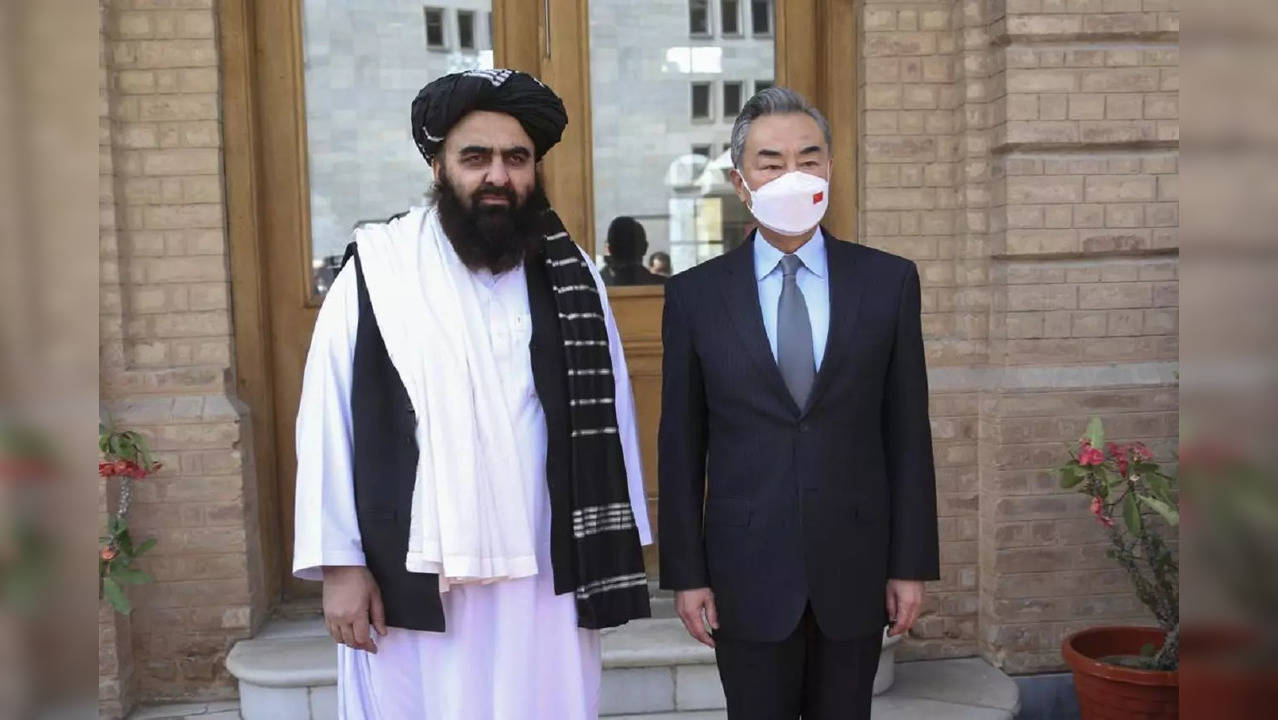Afghanistan offers China an opportunity to prove itself
China will not give the Taliban a free pass. Eventually, China will expect international (especially regional) recognition of the Taliban government, as well as domestic reforms, strengthened internal governance, and measurable gains in combating terrorism.

In this photo released by Xinhua News Agency, Chinese Foreign Minister Wang Yi, right, poses for photos with Amir Khan Muttaqi, acting foreign minister of the Afghan Taliban's caretaker government, in Kabul, Afghanistan on March 24, 2022.
Photo : AP
South Asia specialists in China have been engaging their foreign counterparts to advance Beijing’s position in an unlikely place: Afghanistan. In March, China convened four private dialogues and one international closed-door conference intended to pave the way for China’s activities in the country.
What does China want in Afghanistan? And what concessions are China’s leaders willing to make to accomplish their goals?
Many in China see Afghanistan as a diplomatic opportunity following the failure of the United States. Washington’s inglorious retreat from the country last August has led Chinese policy wonks to view Afghanistan as a chance to demonstrate a “superior model” of stabilisation and post-conflict reconstruction. Buoyed by this idea, China is putting unprecedented effort into rallying regional support for a consensus, a shared agenda, and an action plan for Afghanistan’s future.
But China’s engagement in Afghanistan is driven by more than a desire to succeed where the US could not. Within the broader South Asian region, China sees engagement in Afghanistan as an opportunity to hedge against political turmoil in Pakistan and Myanmar, challenges with financing in Nepal and Sri Lanka, and a new diplomatic push by the US in Bangladesh.
Although China has not officially recognised the Taliban-led government, Beijing’s actions show that it is nonetheless ready to do business with Kabul. During the March meetings, Taliban Foreign Minister Amir Khan Muttaqi was given equal status to other participating foreign ministers from Russia, Pakistan, and elsewhere. Meanwhile, South Asia specialists of the Chinese government have publicly termed the Taliban the “de facto, functional government of the country” and the “legitimate representative of the Afghan people.”
China does appear to have conditions for full diplomatic recognition of the Taliban government. On April 1, Chinese Foreign Minister Wang Yi said that “Afghanistan should not become a failed country” and that it deserves a “place among the family of nations.” Yet he added: “With stronger responses on all parties’ concerns, diplomatic recognition of the Afghan government will be reached. We hope the [Taliban government] can march toward this correct direction and make concrete efforts.”
Reading between the lines, Wang’s statement suggests that while China doesn’t oppose diplomatic recognition in principle, it will refrain from offering it until a few conditions are met. These likely include national reconciliation, the formation of a more inclusive government, guarantees of employment and education for women and children, and a commitment to combatting terrorism.
Still, China is not waiting for the Taliban government to act before engaging. On March 31, China along with Iran, Pakistan, Russia, Tajikistan, Turkmenistan, and Uzbekistan agreed to a package of 72 development commitments under six broad categories: Humanitarian assistance, connectivity, economy and trade, agricultural, energy, and capacity building.
Some of the commitments are not new – such as the supply of humanitarian aid – while others are positions rather than projects. But there are concrete proposals that would increase Afghanistan’s economic potential if fully implemented. Iran’s vow to complete and extend the Khaf-Herat railway would connect the country to Central Asia via Mazar-e-Sharif, while Pakistan’s commitment to finishing the Torkham-Jalalabad Road project would re-establish bus service between Pakistan and Afghanistan.
There are also commitments to energy initiatives, such as the Turkmenistan-Afghanistan-Pakistan-India transnational gas pipeline and the Pul-e-Khumri-Surkhan transmission line.
What the list lacks, however, are timelines. Not even the pledge to increase “delivery of humanitarian assistance” indicates the quantity and quality of what will be delivered. So, while it is impressive that China convinced Afghanistan’s neighbors to commit to rebuilding Afghanistan after two decades of war, the lack of deadlines raises questions about eventual implementation.
None of that seems to bother Beijing. As stated in the March 31 agreement, “China supports its enterprises in investing and starting businesses in Afghanistan when the security situation permits, and in resuming projects such as the Aynak copper mine and the Amu Darya oilfield in due course.”
The statement also made clear that “China supports its enterprises to help Afghanistan improve its mobile network and explore and develop mineral resources.” This essentially constitutes a green light for Chinese companies to return to Afghanistan.
While many Chinese and foreign observers had expected China to move cautiously in Afghanistan, it now appears Beijing has concluded that the benefits of action outweigh the risks. If Afghanistan’s security situation remains stable, we should expect to see Chinese companies returning to the country soon.
Clearly, Beijing is poised to lead global efforts to reengage in Afghanistan. The level of interest and resources allocated for the diplomatic rallying for Afghanistan is unprecedented in China’s modern history. While competing with the US is a clear motivator, China also wants to deliver a positive example of its approach to post-conflict economic reconstruction.
China will not give the Taliban a free pass. Eventually, China will expect international (especially regional) recognition of the Taliban government, as well as domestic reforms, strengthened internal governance, and measurable gains in combating terrorism. But China is already banking on these developments. Assuming that the Taliban is receptive, China’s engagement in Afghanistan is only expected to grow.
In arrangement with Syndication Bureau
Yun Sun is a guest contributor. Views expressed are personal.
Trending:
End of Article
Subscribe to our daily Newsletter!
Related News





Sadhguru Lists 5 Things To Remember When You Vote

Why Politicians Make Excellent Social Media Content Creators

China’s Military's Agenda

Opinion | Gender Justice In AI Isn't Just About Fairness; It's A Strategic Call For India

Elections And Safety: The Role Of Candidate Selection In Addressing Crime Against Women In West Bengal








